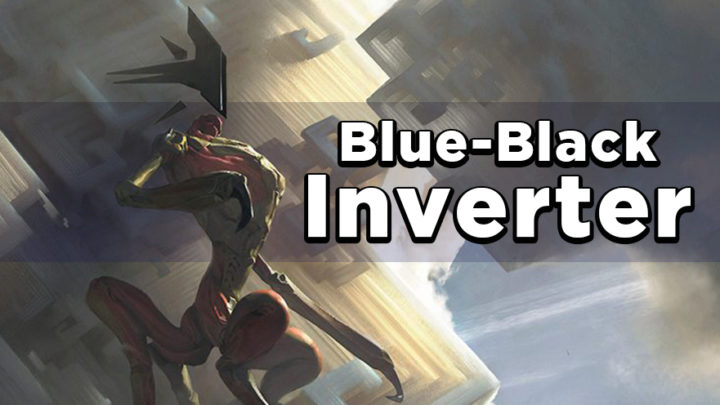Editor’s Note: Inverter of Truth has been banned in Pioneer effective August 3, 2020.
Last weekend, we saw the first round of Regional Players Tour events in Brussels and Nagoya. Dimir Inverter was the deck to beat in both events, and things didn’t go spectacularly well for those attempting to do so — Inverter took six of the sixteen potential Top 8 slots between both events. This deck bears a striking resemblance to a certain combo deck that used to be popular in Modern, so it’s no wonder so many of the game’s top players gravitated to it.
Why Play Inverter?
Splinter Twin, is that you??
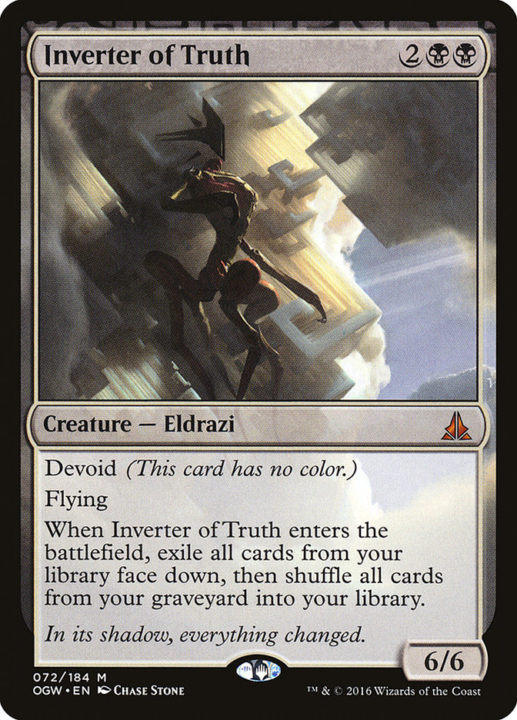
Dimir Inverter is a combo-control deck that aims to exile its library with Inverter of Truth and then win with either Thassa’s Oracle or Jace, Wielder of Mysteries. Dig Through Time and Murderous Cut are the primary ways to keep your graveyard as small as possible and make Inverter of Truth an effective combo piece.
While the combo is the deck’s primary win condition, Dimir Inverter can also function as a control deck. It packs plenty of interactive elements, such as Thoughtseize, Fatal Push, Censor, and Drown in the Loch to keep opponents off balance. Card selection and advantage is also important for combo-control strategies, so Opt, Dig Through Time, and Omen of the Sea are crucial to the deck’s success.
Sample Decklist
Dimir Inverter by Piotr Glogowski – 2nd Place at Players Tour Brussels
3 Jace, Wielder of Mysteries
4 Inverter of Truth
4 Thassa’s Oracle
2 Thought Erasure
4 Thoughtseize
2 Censor
4 Dig Through Time
2 Drown in the Loch
4 Fatal Push
4 Opt
2 Omen of the Sea
2 Choked Estuary
4 Drowned Catacomb
4 Fabled Passage
2 Fetid Pools
6 Island
3 Swamp
4 Watery Grave
Sideboard:
1 Ashiok, Nightmare Weaver
2 Cry of the Carnarium
1 Damping Sphere
1 Grafdigger’s Cage
1 Jace, Vryn’s Prodigy
1 Kalitas, Traitor of Ghet
1 Legion’s End
3 Mystical Dispute
1 Noxious Grasp
1 The Scarab God
1 Thief of Sanity
1 Ultimate Price
Combo Pieces
Jace, Wielder of Mysteries
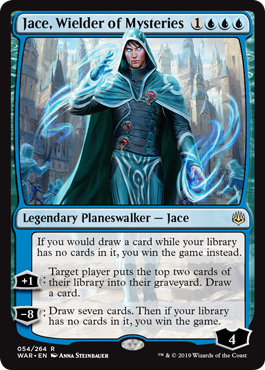
Jace, Wielder of Mysteries is both a win condition and a source of consistent card advantage in this deck. Capable of setting up a turn five win when coupled with Inverter of Truth or winning the game by itself against control decks, Jace has found an excellent home in Dimir Inverter.
Thassa’s Oracle
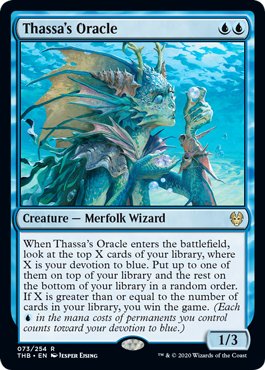
Thassa’s Oracle may look innocuous, but like Jace, it can also team up with Inverter of Truth to produce turn five wins. The key difference is that Thassa’s Oracle costs two mana, so you can have a clean turn six win provided you have blue devotion equal to or greater than the number of cards in your graveyard. If you draw several copies of Thassa’s Oracle, it’s also a fine two-mana 1/3 blocker against aggressive decks. Oracle looks a lot like Deceiver Exarch in this deck, but the cool thing it can do that Exarch couldn’t is win through a removal spell. If your opponent removes your Oracle with its trigger on the stack, the trigger will still resolve and check your devotion count after the Oracle has died.
Inverter of Truth

Yanked from bulk boxes around the world, the Pioneer all-star known as Inverter of Truth is the linchpin of the deck. Both Thassa’s Oracle and Jace, Wielder of Mysteries can win the game once your library is empty, but Inverter is really the only way to enable them. Exiling your library and replacing it with your graveyard is a risky plan in normal games of Magic, but Dimir Inverter doesn’t play normal games. In order to make sure your graveyard is small enough to win the game, the deck has maxed out on Dig Through Time to delve cards away. However, drawing an Inverter with Jace or Oracle is much better than drawing a Splinter Twin without a Deceiver Exarch; this 6/6 flyer can still put away the game with just a few swings.
Dig Through Time
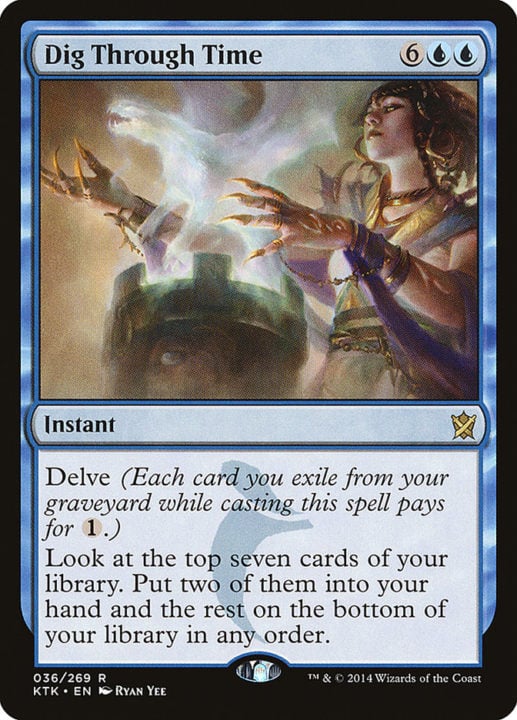
Dig Through Time may not be a combo piece in this deck, but it’s an indispensable combo enabler. In the games where you need to win quickly, Dig Through Time can find both pieces of the combo and while emptying your graveyard so Inverter of Truth can do its thing. Dig can also help you just play a control game by giving you both card advantage and selection, which is fairly rare in Pioneer.
Disruption
Whether Dimir Inverter is comboing quickly or grinding out a long game, the disruption suite is the backbone of the deck. Let’s take a look at the key disruptive cards.
Thoughtseize
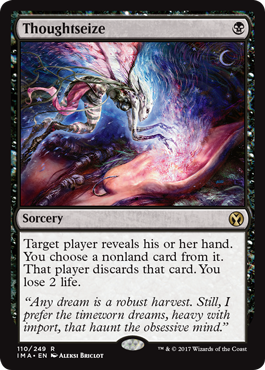
Thoughtseize is on the shortlist for best card in Pioneer, and it excels in Dimir Inverter. Whether you’re trying to defend your combo or break up an opponent’s plan, Thoughtseize fits the bill.
Thought Erasure
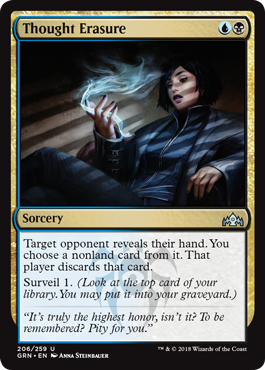
Alas, we can only play four copies of Thoughtseize, so most Inverter decks include two copies of Thought Erasure as well. While Thought Erasure costs more mana than Thoughtseize, it saves you two life, which could be relevant against aggressive strategies. The “Surveil 1” ability is occasionally nice, too.
Censor
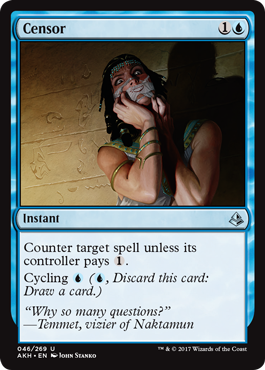
Censor hasn’t seen much play outside of Standard, but it seems to be making itself a name in Pioneer. If decks continue to play multiple four- and five-mana spells, players are a lot more likely to tap out, which makes Censor’s value go up. It’s hard to find a powerful early-game counterspell that has utility later on; an otherwise useless Censor can easily turn into a cantrip to help find combo pieces or more effective disruption.
Fatal Push
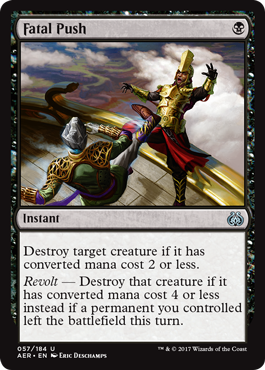
Fatal Push sees play in almost every interactive black deck in Pioneer, Modern, and Legacy. It’s no surprise to see Dimir Inverter playing the full four copies in order to stem the bleeding from early creatures. Protecting Jace from creature attacks is especially important if you need to use him to combo off.
Drown in the Loch
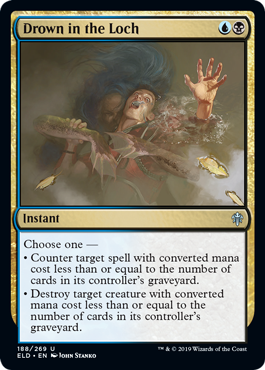
Drown in the Loch is one of the more versatile cards printed in recent memory; it’s essentially a split card with Counterspell//Terminate modes. Both card types have their weaknesses: Counterspell doesn’t play to the board, and Terminate can’t always play effectively on the stack. Drown in the Loch is an excellent pairing of both cards, and exactly the kind of answer Dimir Inverter is looking for.
The Cantrips
Like any good combo deck, you need to be able to find your combo pieces, and cantrips are traditionally the best way to go about that.
Opt
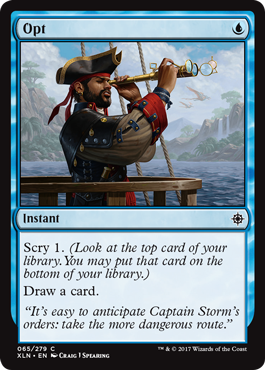
Opt is a one mana instant cantrip that gives you a little bit of selection while replacing itself. While most sorcery-speed cantrips are more powerful, Opt allows you to use your mana effectively in a deck with a higher density of instants.
Omen of the Sea
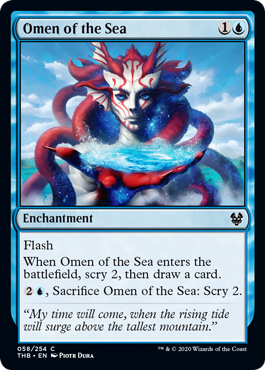
Isn’t this just a Theros Beyond Death draft common? Yes, but it has plenty of use in Inverter. Omen of the Sea checks a couple boxes: it’s an instant-speed spell that provides card selection, and unlike Opt, it doesn’t go to your graveyard unless you sacrifice it. The sacrifice ability does provide a little extra value later in the game if you have extra mana lying around.
Notable Lands
As a two-color deck, Dimir Inverter has the option of playing utility lands. The downside is because of the deck’s harsh mana requirements — UU for Thassa’s Oracle, 1UUU for Jace — colorless lands like Field of Ruin are often off the table.
Fetid Pools
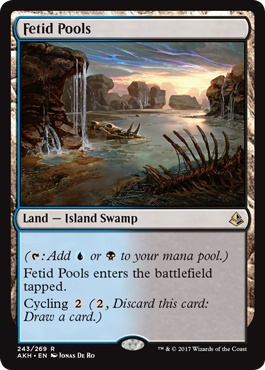
Fetid Pools is a decent land to play early in the game; it comes into play tapped and adds both blue and black. As the game goes on, the ability to cycle it is quite a benefit.
Fabled Passage
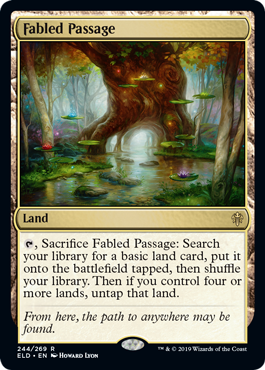
Fatal Push excels at killing the small creatures of Pioneer, but without access to fetchlands, it can struggle against three- and four-mana creatures. Fabled Passage is a good way to both fix your mana and turn on revolt to let Fatal Push tackle slightly larger threats.
What Does Inverter Beat?
Dimir Inverter is a rare breed: it’s a creature-based combo deck that gets to ignore removal spells a good chunk of the time. That bodes well for games against most of the traditional midrange decks of Pioneer. Control decks tend to give creature combo decks a fit as well, but luckily, Dimir Inverter has six discard spells and seven counterspells in the 75. The big-mana ramp decks also don’t have a ton of disruption or a fast clock, which means they have to hope that the Dimir player simply can’t find the combo in time.
What Does Inverter Lose To?
The simple answer is aggro decks. Spirits, Mono-Black Aggro, and smaller versions of Mono-Red can cross the finish line before a Thassa’s Oracle shows up to ruin their fun. Mono-Red has just enough speed to outrace Inverter; Mono-Black has a slightly slower clock, but packs enough discard spells to trip up Inverter players. Spirits, meanwhile, has enough speed and disruption to create a nightmare match-up for Inverter.
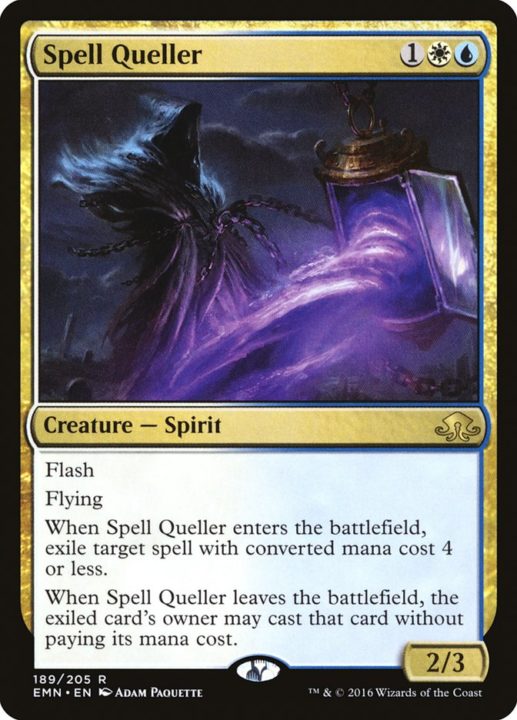
After seeing Dimir Inverter run the tables in both Brussels and Nagoya, I’m interested to see if anyone has found a solid answer to it in time for Players Tour Phoenix this weekend. As always, if you agree with my assessment, think I missed something, or just want to leave general feedback, you can find me on Twitter at @RappaciousOne!

Michael Rapp is a Modern specialist who favors Thoughtseize decks. Magic sates his desire for competition and constant improvement.

